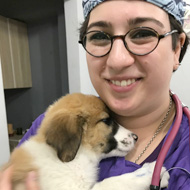Mayhew announces new Tbilisi clinic

Dr Ana Metskhvarishvili.
Mayhew has announced that it will open the first not-for-profit neutering clinic in Tbilisi, Georgia.
The new clinic will provide preventative veterinary care in the city, including vaccinations, neutering and parasite control.
Both roaming dogs and owned dogs will benefit from the care, and the three veterinary surgeon one veterinary assistant team will also use the new clinic as a training centre for veterinary professionals in Georgia.
Dr Ana Metskhvarishvili, head veterinary surgeon of Mayhew Georgia, celebrated the announcement: “We have been working towards having our own clinic for some time. It makes me very proud that it has now been realised.
“It is an important step to have a high-standard, stress-free environment for both animals and the vet team and for the students who will come to learn from us. This will be a massive help in supporting Tbilisi to managing the roaming dog population.”
The veterinary team has previously been providing neutering services from Mtskheta, a town 20km from the capital city Tbilisi, from a temporary facility.
Head of International Projects and Relations at Mayhew, Caroline Yates said: “Mayhew Georgia funds a free Trap, Vaccinate, Neuter, Return (TVNR) programme in Tbilisi, not only vaccinating the dogs against rabies but also administering a complex vaccine which protects dogs against common canine infectious diseases such as parvo-virus and distemper - still common in Georgia.
“In the previous five years we have delivered the programme via vet practices in Tbilisi where there are Mayhew trained vets but establishing our own clinic will enable us to expand the programme, build capacity within the Georgian veterinary profession and help the local authorities humanely manage the roaming animal populations in the city, making Tbilisi a healthier and happier place for the residents and animals alike.”



 The Veterinary Medicines Directorate (VMD) is inviting applications from veterinary students to attend a one-week extramural studies (EMS) placement in July 2026.
The Veterinary Medicines Directorate (VMD) is inviting applications from veterinary students to attend a one-week extramural studies (EMS) placement in July 2026.